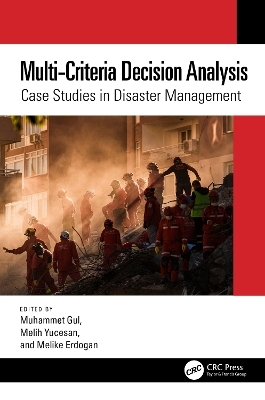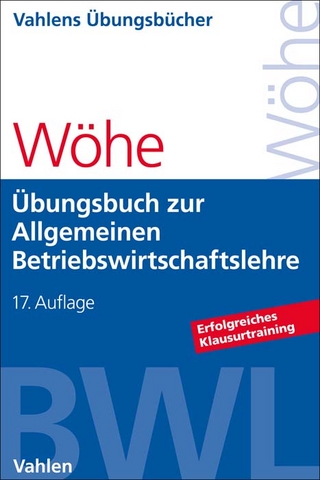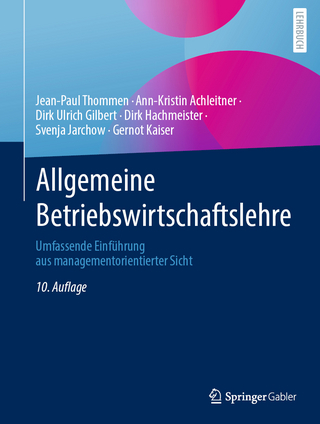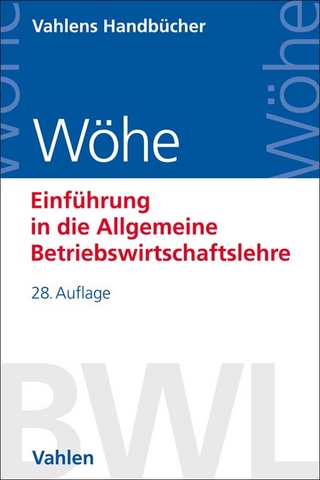
Multi-Criteria Decision Analysis
CRC Press (Verlag)
978-1-032-08094-9 (ISBN)
Multi-Criteria Decision-Making (MCDM) includes methods and tools for modeling and solving complex problems. MCDM has become popular in the production and service sectors to improve the quality of service, reduce costs, and make people more prosperous. This book illustrates applications through case studies focused on disaster management.
With a presentation of both Multi-Attribute Decision-Making (MADM) and Multi-Objective Decision-Making (MODM) models, this is the first book to merge these methods and tools with disaster management. This book raises awareness for society and decision-makers on how to measure readiness and what necessary preventive measures need to be taken. It offers models and case studies that can be easily adapted to solve complex problems and find solutions in other fields.
Multi-Criteria Decision Analysis: Case Studies in Disaster Management will offer new insights to researchers working in the areas of industrial engineering, systems engineering, healthcare systems, operations research, mathematics, business, computer science, and disaster management, and, hopefully, the book will also stimulate further work in MCDM.
Muhammet Gul has been working as an Associate Professor at the Department of Transportation and Logistics, Istanbul University, Istanbul, Turkey. He has received his MSc and Ph.D. in Industrial Engineering from Yildiz Technical University. His research interests are in simulation modeling, healthcare system management, occupational safety and risk assessment, multi-criteria decision-making, and fuzzy sets. He is the editor-in-chief of two books released in 2020: Computational Intelligence and Soft Computing Applications in Healthcare Management Science (IGI-Global) and Fine–Kinney-based fuzzy multi-criteria occupational risk assessment: Approaches, Case studies and Python applications (Springer). He is also the Associate Editor of Complex & Intelligent Systems (IF: 4.927), Mathematical Problems in Engineering (IF: 1.305), and Journal of Healthcare Engineering (IF: 2.686). Melih Yucesan completed his Ph.D. and has been working as Associate Professor at the Department of Emergency Aid and Disaster Management, Munzur University, Tunceli, Turkey. He received his PhD in Econometrics from Karadeniz Technical University. His research interests are in planning, forecasting, multi-criteria decision-making and fuzzy sets. His papers appeared in international journals such as International Journal of Disaster Risk Reduction, Applied Soft Computing, Energy Policy, Soft Computing and International Journal of Healthcare Management. Melike Erdogan completed her Ph.D. at the Department of Industrial Engineering, Yıldız Technical University in 2018 and has been working as an Assistant Professor in Düzce University, Department of Industrial Engineering. Her research interests are Decision Making, Fuzzy Logic and Risk Analysis. Her papers appeared in journals such as Applied Soft Computing, Sustainable Cities and Societies, Soft Computing and Neural Computing and Applications.
1. A Brief Review of the Applications of MCDA in Disaster Management
2. Multi-Criteria Decision Analysis Models for Emergency and Disaster Management: A Systematic Review
3. Volunteer Assignment Optimization: A Systematic Literature Review with Analysis and Future Directions
4. Flood Risk Management Through Multi-Criteria Decision-Making: A Review
5. Maritime Supply Chain Resilience Applications in the COVID-19 Pandemic
6. Assessment and Reinforcement of Airport Climate Resilience with a BWM-Enhanced Hoshin Kanri Method
7. The Evaluation of Social Vulnerability Factors for Pandemics Based on Fuzzy DEMATEL and the Delphi Method
8. Drought Vulnerability Assessment Based on IVIF AHP and IVIF WASPAS: A Case Study in Turkey
9. Evaluation of the Performance of the Health Systems of 12 OECD Countries in Terms of Preparedness for Pandemics
10. The Use of VIKOR in Location Selection of Field Hospitals: An Application from Çanakkale, Turkey
11. Drone Evaluation and Selection for Training in Disaster Preparedness Phases with Interval MCDA Techniques
12. Emergency Department Preparedness Assessment for Outbreaks by a Combined Bayesian BWM–RIM Model
13. Ranking of Districts of Istanbul According to Earthquake Loss Estimates with Entropy and CoCoSo Integration
14. Evaluation of Criteria Affecting the Preparedness Levels of Hospitals in Pandemic Periods by the Entropy Weighting Method: A Case Study for the COVID-19 Pandemic
15. Prioritizing Post-Disaster Debris for Recycling
16. A GIS-Based Multi-Criteria Decision Analysis Framework for Evaluation of Emergency Assembly Points
17. A Novel Interval Valued Neutrosophic AHP-WASPAS Methodology for Emergency Supply Depot Location Selection Problems
18. UAV Selection for Post-Disaster Medical Supply Distribution Using a Two-Level Interval-Valued Pythagorean Fuzzy AHP Integrated Interval-Valued Pythagorean Fuzzy VIKOR Methodology, and an Application
19. A Simulation-Based Approach for Decision- Making in Earthquake Crisis Management
20. Routing of Vehicles to Disaster Relief Tents
21. Disaster Management with Fuzzy Sets and Engineering Economic Analysis
| Erscheinungsdatum | 30.11.2022 |
|---|---|
| Zusatzinfo | 117 Tables, black and white; 25 Line drawings, black and white; 9 Halftones, black and white; 34 Illustrations, black and white |
| Verlagsort | London |
| Sprache | englisch |
| Maße | 156 x 234 mm |
| Gewicht | 807 g |
| Themenwelt | Technik ► Umwelttechnik / Biotechnologie |
| Wirtschaft ► Betriebswirtschaft / Management ► Allgemeines / Lexika | |
| Wirtschaft ► Volkswirtschaftslehre | |
| ISBN-10 | 1-032-08094-9 / 1032080949 |
| ISBN-13 | 978-1-032-08094-9 / 9781032080949 |
| Zustand | Neuware |
| Informationen gemäß Produktsicherheitsverordnung (GPSR) | |
| Haben Sie eine Frage zum Produkt? |
aus dem Bereich


